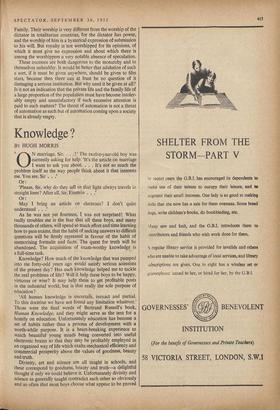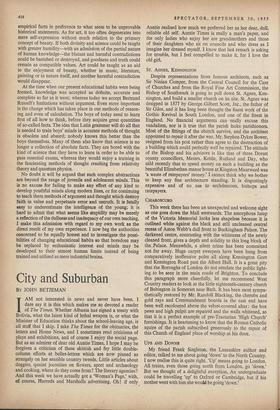Knowledge?
BY HUGH MORRIS N marriage, Sir. . . ! ' The twelve-year-old boy was earnestly asking for help. 'It's the article 6n marriage I want to ask you about. . . . It's not so much the problem itself as the way people think about it that interests me. You see, Sir . .
Or: 'Please, Sir, why do they tell us that light always travels in straight lines? After all, Sir, Einstein . .
Or: May I bring an article on electrons? I don't quite understand . .
As he was not yet fourteen, I was not surprised ! What really troubles me is the fear that all these boys, and many thousands of others, will spend so much effort and time learning how to pass exams, that the habit of seeking answers to difficult questions will be firmly repressed in favour of the habit of memorising formulm and facts. The quest for truth will be abandoned. The acquisition of exam-worthy knowledge is a full-time task.
Knowledge? How much of the knowledge that was pumped into me forty-odd years ago would satisfy serious scientists of the present day? Has such knowledge helped me to tackle the real problems of life? Will it help these boys to be happy. virtuous or wise? It may help them to get profitable posts in the industrial world, but is that really the sole purpose of education?
'All human knowledge is uncertain, inexact and partial. To this doctrine we have not found any limitation whatever.' Those were the final words of Bertrand Russell's book. Human Knowledge, and they might serve as the text for a homily on education. Unfortunately education has become a set of habits rather than a process of development with a worth-while purpose. It is a heart-breaking experience to watch beautiful young minds being converted into useful electronic brains so that they may be profitably employed in an organised way of life which exalts mechanical efficiency and commercial prosperity above the values of goodness, beauty and truth.
Divinity, art and science are all taught in schools, and these correspond to goodness, beauty and truth—a delightful thought if only we could believe it. Unfortunately divinity and science as generally taught contradict each other so obviously and so often that most boys choose what appear to be proved empirical facts in preference to what seem to be unprovable historical statements. As for art, it too often degenerates into mere self-expression without much relation to the primary concept of beauty. If both divinity and science could be taught with greater humility—with an admission of the partial nature of human knowledge—the blatant and harmful contradictions could be banished or destroyed, and goodness and truth could remain as compatible values. Art could be taught as an aid to the enjoyment of beauty, whether in music, literature, painting or in nature itself, and another harmful contradiction would disappear.
At the time when our present educational habits were being formed, knowledge was accepted as definite, accurate and complete so far as it went; whereas today we accept Bertrand Russell's limitations without argument. Even more important is the change which has taken place in our methods of reason- ing and even of calculation. The boys of today need to learn first of all how to think, before they acquire great quantities of so-called facts. The idea that Latin grammar will do all that is needed to train boys' minds in accurate methods of thought is obsolete and absurd; nobody knows this better than the boys themselves. Many of them also know that science is no longer a collection of absolute facts. They are bored with the kind of science that they have to learn in order to be able to pass essential exams, whereas they would enjoy a training in the fascinating methods of thought resulting from relativity theory and quantum physics.
No doubt it will be argued that such complex abstractions are beyond the range of juvenile and adolescent minds. This is no excuse for failing to make any effort of any kind to develop youthful minds along modern lines, or for continuing to teach them methods of argument and thought which destroy faith in value and perpetuate error and untruth. It is fatally easy to underestimate the intelligence of the young; it is hard to admit that what seems like stupidity may be merely a reflection of the dullness and inadequacy of our own teaching. I make this admission with regard to my own work as the direct result of my own experience. I now beg the authorities concerned to be equally honest and to investigate the possi- bilities of changing educational habits so that boredom may be replaced by enthusiastic interest and minds may be developed to their utmost human limits instead of being trained and utilised as mere industrial brains.



































 Previous page
Previous page